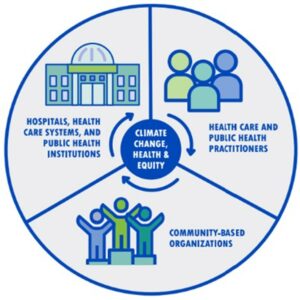Erica Browne, DrPH, MPH, Program Officer, The Kresge Foundation
In 2018, the Kresge Foundation launched the Climate Change, Health, and Equity (CCHE) initiative as a 5-year, $22 million commitment to accelerate action on climate change and climate-related inequities in health. Since its inception, the CCHE network has worked in distinct, yet aligned strategies that focus on health institutions, practitioner and professional societies, and community-based organizations. The priority was to bring together diverse grant-funded partners at different points along their equity journey, with initiative partners providing evaluation, technical assistance, and support to sustain the network.

From the beginning, our partners were clear about the necessity of centering racial justice. In New York, WE ACT for Environmental Justice used data to help policy makers see the undeniable connections between race and extreme heat. Their advocacy resulted in successful messaging about extreme heat as a racial justice issue during mayoral candidate forums and led to the announcement from Governor Hochul that the Home Energy Assistance Program would be expanded. UPROSE’s advocacy—as a member of NY Renews Coalition—contributed to the State of New York agreeing to the Climate Leadership and Community Protection Act requirement that 35-40 percent of clean energy investment benefits go to disadvantaged communities. Physicians for Social Responsibility-Los Angeles reminded us that the “base of Black and Brown grassroots leaders and activists has engaged with local municipal utility representatives to elevate the need for immediate emergency utility relief and long-term systemic change that ensures energy justice.”
As an initiative team, cultivating a learning community that included various racial justice practices required us to explore more keenly our own understanding of racial justice.
The Centrality of Racism
At Kresge, our approach to racial justice is to challenge structures that perpetuate systems of oppression while partnering with Black, Indigenous, People of Color (BIPOC) community leaders on solutions that confront the systems of racial exclusion that have defined the economic landscape of America’s cities. For us, racial justice includes acknowledging the history of racism, providing resources to organizations that build the power of BIPOC communities, and uplifting transformative solutions that dismantle systems of oppression to build alternatives. We know that racism drives the disproportionate climate impacts and preventable differences in health outcomes and access that BIPOC communities experience.
- For example, Indigenous people are 48 percent more likely to live in areas where the highest percentage of land is projected to be inundated due to sea level rise.
- Black residents are 40 percent more likely to live in areas with the highest projected increases in mortality rates due to climate-driven changes in extreme temperatures.
- Latinx residents are 43 percent more likely to live in areas with the highest projected labor hour losses in weather-exposed industries due to climate-driven increases in high-temperature days.
- Extreme climate events lead to health system disruptions, hospital closures, workforce burnout, and reduced availability of medical supplies, especially in BIPOC communities.
- Essential hospitals that serve the most vulnerable communities operate in areas with disproportionate rates of climate-related mortality and resource constraints that limit their ability to invest in climate mitigation and resilience infrastructure.
In the environmental movement, racism has systematically excluded BIPOC leadership.
- Most full-time staff at environmental nonprofit organizations are White (60 percent), while Black (10.8 percent) and Latinx (10 percent) staff representation is below national demographic baselines, and American Indian or Alaska Native staff (0.5 percent), Native Hawaiian or Pacific Islander staff (0.3 percent), and Middle Eastern or North African staff (0.3 percent) are the least represented.
- Among senior leaders, no Indigenous persons were identified among the White (73.1 percent), Asian (10.4 percent), and Black (7.5 percent) leaders.
Racism also shapes how philanthropy responds to climate justice and health equity efforts. Although U.S. foundations in 2019 invested $272 million in climate, health, and equity, this accounted for only 14 percent of the $1.9 billion in grantmaking that year. Foundations, on average, fund White-led organizations at nearly 40 percent more annually than BIPOC-led organizations that have an average operational budget that is 3 percent that of White-led organizations.
Even as an early adopter of the Climate Funders Justice Pledge, we still experienced challenges centering racial justice throughout our work.
Adjusting Our Approach
Although the CCHE initiative focuses on climate and health equity, our early learnings revealed that we could not center racial justice until we defined equity. We needed to be intentional about uncovering the “what,” “how,” and “for whom” we would advance racial justice while being flexible and responsive to political context. To do this, we reflected on our assumptions, revised our theory of change, and considered how to integrate community power building as a driver of community-led change. Because our grant-funded partners often had more advanced racial justice concepts and practices, we used their articulations of community power and liberation as aspirations. Their direct feedback helped us further develop our approach, discuss racial justice more explicitly, and interrogate whether our decisions and commitment were aligned. With our communications partner, Metropolitan Group, the CCHE network developed a messaging framework to help us effectively communicate our core values. For those ready to talk about racism, the framework includes messages on climate impacts differentiated by race and the need for corrective policy. Through the development process, we learned that using a racial justice frame, backed by evidence, is a powerful tool for us to pick up, sharpen, and use regularly.
We also learned that increasing resident voice, pressure, and participation during policy adoption and implementation is critical. Empowered, vocal residents help increase public support and political will for racially just policy. Community engagement—that equips residents with the skillsets and tools that make it difficult for state and local officials and decision-makers to advance policy without community input—is a powerful change mechanism. Deepening our investments in BIPOC-led organizations is key, and implementation of the Justice40 Initiative and Bipartisan Infrastructure Framework provide opportunities for us to center racial justice in funding, decision-making, and leadership support opportunities for BIPOC communities. A racism-neutral approach to deeply rooted racial inequities is woefully insufficient, and we’re earnestly learning how to demonstrate an explicit commitment to racial justice throughout our work.
References
Chandler, P. “Green 2.0 2021 NGO & Foundation Transparency Report Card.” 2021: p 1-157.
EPA. 2021. “Climate Change and Social Vulnerability in the United States: A Focus on Six Impacts.” U.S. Environmental Protection Agency, EPA 430-R-21-003.
Frentzel E, Roberson B, Madan I, Lambalot H, Ramiah K. “The State of Climate Resilience and Climate Mitigation Efforts at Essential Hospitals: Findings and Recommendations from a Formative Evaluation.” Essential Hospitals Institute. November 2019.
Gupta, S. “Climate Change, Health, and Equity: Survey Findings: Gaps, Needs and Opportunities.” Health and Environmental Funders Network. March 2020: p. 1-17.
Seervai S, Gustafsson L, Abrams M. “The Impact of Climate Change on Our Health and Health Systems.” The Commonwealth Fund EXPLAINER. May 4, 2022. Available from:
State of New York Governor Kathy Hochul. “Governor Hochul Announces Expanded Eligibility for $15 Million in Cooling Assistance.” Albany, NY. May 2, 2022.
The White House Briefing Room. “Fact Sheet: Bipartisan Infrastructure Framework Will Address Barriers Communities of Color Face to Economic Opportunity.” June 29, 2021.
Website. “Climate Funders Justice Pledge.” September 1, 2022.
Website. “Climate Change, Health and Equity (CCHE).” August 30, 2022.
Website. “CCHE Peer Learning Resources.” August 30, 2022.
Website. “NY Renews.” August 30, 2022.
White House Environmental Justice Advisory Council. “Justice40 Initiative Implementation Phase 1 Recommendations.” August 17, 2022.
This Views from the Field article is part of “Learning What it Takes,” a special series from The Kresge Foundation and Grantmakers In Health that explores the lessons learned from Kresge’s Climate Change, Health & Equity (CCHE) initiative. Click here to learn more.

